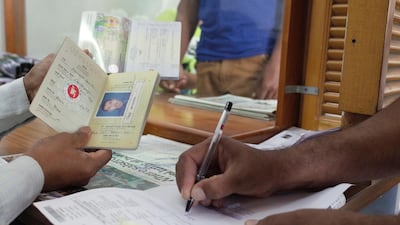This week's announcement of amendments to the laws governing residency and ownership of companies is a brave step. The long-term objectives of the changes have been clearly spelt out by Sheikh Mohammed bin Rashid, the Vice President and Prime Minister and Ruler of Dubai.
The best way of attracting global investment and exceptional talents to the UAE, he said, is through an "open environment, tolerant values, infrastructure and flexible legislation”.
These new moves should be seen as a firm and decisive step on the path to achieve that. They are a beginning, not an end.
One surprise is the breadth of the changes, in particular with regards to the creation of a 10-year residency visa for qualified professionals and their families. That will have an enormous impact, both in terms of the stability it offers for those concerned but also in terms of the decisions they make about how to invest for their futures.
I hope that, in future, this facility will be extended to those beyond the currently designated categories of doctors, engineers and specialists working in medicine, science, research and technical fields.
Those in the fields of the arts, such as sculptors, musicians, painters, historians, writers and others, also have an essential part to play, if, in Sheikh Mohammed’s words, the UAE is to “remain a global incubator for exceptional talents”.
I hope also that the issue of the ability of expatriates to stay here after retirement will be addressed at a future date. Indeed, those benefiting from 10-year visas who invest in local property will eventually require some assurance that they are not obliged to sell up and depart once they retire.
Expatriates who have been in the workforce for years, perhaps decades, have experience of our economy and way of life that newcomers will take years to obtain. Even in retirement, such people can still contribute in many ways to development, even if they do not plough their savings into property or new businesses.
Those are among topics that can be tackled in the future – for it would be reasonable to expect that this is only one more step on the continuing process of change as the country evolves. The complexity and diversity of the issues being addressed will require that.
One key aspect of Sunday's announcement is the implicit recognition that those categories of expatriates now able to obtain 10-year residence visas are no longer viewed simply as "temporary" workers. That will fundamentally change their own views of their status here.
Many are likely to decide to invest here at least some of the savings they would have previously allocated to investment in their countries of origin. At a time when the property market is, at best, sluggish, that’s certainly something to be welcomed.
The decision that students will also be able to secure five-year visas, with 10 years for those deemed "exceptional", is also an excellent step. For years the UAE has suffered from a brain drain, not of its own citizens but of those who have been spent their childhood and have completed their education here, whether born in the UAE or not. Those unable to find jobs here, particularly young men, who after the age of maturity, can no longer be sponsored by their parents, leave to take up employment elsewhere. This new rule will encourage them to stay so that this country can benefit from the expertise and talent that it has nurtured.
As for the decision to allow 100 per cent foreign ownership of companies, that could prove beneficial in a variety of ways. The initial focus of discussion has been on the attracting of more foreign direct investment, into manufacturing, for example. There’s potential benefit too for the stock markets in Abu Dhabi and Dubai, where existing limits on the percentage of foreign ownership have discouraged foreign buyers. Listing of companies here, rather than on overseas stock markets, may become more attractive.
It would be naive, though, to assume that everything that arises from the changes will be beneficial to all concerned.
Current regulations on company ownership, for example, have helped to ensure that Emirati citizens can share in the wealth being created in the local economy. Once 100 per cent foreign ownership is allowed, what impact will that have on those who depend on their sponsorship of companies?
Many foreign firms might wish to break their agreements with existing Emirati partners. Moreover, can we expect new regulations to ensure that at least some of the profit was retained in the country rather than it all being remitted?
The residential property market is likely to experience a boost from the introduction of 10-year residence visas but there will be side-effects in terms of impact on the demographic structure of the country. The last national census, several years ago, suggested that 11.5 per cent of the country's inhabitants were UAE citizens. If that percentage declines further – and it might already have done so – how can the UAE's own heritage and culture be preserved?
Moreover, changes to residency rules might prompt increased long-term migration to the UAE of people of working age, not just from within the region but from further afield. That, in turn, raises issues related to the supply of housing and of school and university places for dependent children. To what extent should the continued development of the country's infrastructure cater to the needs of expatriates?
All these issues and more, all part of the complexity of the UAE’s unique social and economic structure, will have been taken into account by the government in the discussions leading up to the announcement. The changes represent a brave and welcome step that should be applauded.
Peter Hellyer is a consultant in the UAE's history and culture


